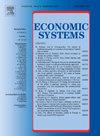Testing the development impact of islamic banking: Islamic moral economy approach to development
IF 3.3
2区 经济学
Q1 ECONOMICS
引用次数: 0
Abstract
Redistributive justice and stakeholder development have been central objectives of the Islamic moral economy for which Islamic banking was considered a facilitatory operational tool. Being its institutional form, the emergence of Islamic finance is, therefore, related to rescuing ‘human, land, labour and capital’ so that extended stake-holding governance can be achieved. As opposed to the institutional logic of conventional finance, within the Islamic moral economy paradigm, Islamic finance, theoretically, is expected to essentialise justice and equilibrium and equalise development opportunities for all stakeholders to fulfil their development path towards perfection. To assess the Islamic moral economy performance of Islamic banking, this paper uses HDI and GINI as the dependent variables to determine short-run and long-run relationships between Islamic banking growth and the development of the economy through socioeconomic indicators. The data covers the period 2000–2021 with fourteen countries with a systemic presence of Islamic finance, The results show that although Islamic banks did not cause an increase in inequality, as opposed to expectations, they neither caused a decrease in the sampled countries. As for the effect of Islamic banking expansion on human development, it positively contributes to human development only in the long run under certain conditions, which cannot be established in the short run. If sustained, this should be considered positive progress as opposed to the experience observed in the initial period of Islamic banking.
检验伊斯兰银行业对发展的影响:伊斯兰道德经济发展方法
再分配正义和利益相关者发展一直是伊斯兰道德经济的核心目标,为此,伊斯兰银行被视为一种便利的业务工具。因此,作为其制度形式,伊斯兰金融的出现与拯救“人力、土地、劳动力和资本”有关,以便实现扩展的股权治理。与传统金融的制度逻辑相反,在伊斯兰道德经济范式中,伊斯兰金融在理论上被期望将正义与均衡本质化,并为所有利益相关者提供平等的发展机会,以实现其走向完善的发展道路。为了评估伊斯兰银行的伊斯兰道德经济绩效,本文采用HDI和GINI作为因变量,通过社会经济指标确定伊斯兰银行增长与经济发展之间的短期和长期关系。数据涵盖2000-2021年期间,14个伊斯兰金融系统存在的国家。结果表明,尽管与预期相反,伊斯兰银行并没有导致不平等的增加,但它们也没有导致抽样国家的减少。至于伊斯兰银行扩张对人类发展的影响,它对人类发展的积极贡献只有在一定的长期条件下才会产生,这在短期内是不可能确立的。如果持续下去,这应被视为积极的进展,而不是在伊斯兰银行业初期所观察到的经验。
本文章由计算机程序翻译,如有差异,请以英文原文为准。
求助全文
约1分钟内获得全文
求助全文
来源期刊

Economic Systems
ECONOMICS-
CiteScore
4.90
自引率
0.00%
发文量
83
审稿时长
48 days
期刊介绍:
Economic Systems is a refereed journal for the analysis of causes and consequences of the significant institutional variety prevailing among developed, developing, and emerging economies, as well as attempts at and proposals for their reform. The journal is open to micro and macro contributions, theoretical as well as empirical, the latter to analyze related topics against the background of country or region-specific experiences. In this respect, Economic Systems retains its long standing interest in the emerging economies of Central and Eastern Europe and other former transition economies, but also encourages contributions that cover any part of the world, including Asia, Latin America, the Middle East, or Africa.
 求助内容:
求助内容: 应助结果提醒方式:
应助结果提醒方式:


